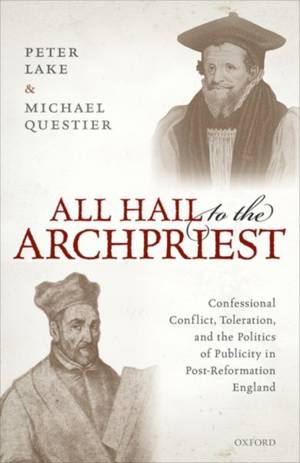
- Afhalen na 1 uur in een winkel met voorraad
- Gratis thuislevering in België vanaf € 30
- Ruim aanbod met 7 miljoen producten
- Afhalen na 1 uur in een winkel met voorraad
- Gratis thuislevering in België vanaf € 30
- Ruim aanbod met 7 miljoen producten
Zoeken
All Hail to the Archpriest
Confessional Conflict, Toleration, and the Politics of Publicity in Post-Reformation England
Peter Lake, Michael Questier
Hardcover | Engels
€ 101,95
+ 203 punten
Omschrijving
All Hail to the Archpriest revisits the debates and disputes known collectively in the literature on late sixteenth and early seventeenth century England as the 'Archpriest controversy'. Peter Lake and Michael Questier argue that this was an extraordinary instance of the conduct of contemporary public politics and that, in its apparent strangeness, it is in fact a guide to the ways in which contemporaries negotiated the unstable later Reformation settlement in England. The published texts which form the core of the arguments involved in this debate survive, as do several caches of manuscript material generated by the dispute. Together they tell us a good deal about the aspirations of the writers and the networks that they inhabited. They also allow us to retell the progress of the dispute both as a narrative and as an instance of contemporary public argument about topics such as the increasingly imminent royal succession, late Elizabethan puritanism, and the function of episcopacy. Our contention is that, if one takes this material seriously, it is very hard to sustain standard accounts of the accession of James VI in England as part of an almost seamless continuity of royal government, contextualised by a virtually untroubled and consensus-based Protestant account of the relationship between Church and State. Nor is it possible to maintain that by the end of Elizabeth's reign the fraction of the national Church, separatist and otherwise, which regarded itself or was regarded by others as Catholic, had been driven into irrelevance.
Specificaties
Betrokkenen
- Auteur(s):
- Uitgeverij:
Inhoud
- Aantal bladzijden:
- 334
- Taal:
- Engels
Eigenschappen
- Productcode (EAN):
- 9780198840343
- Verschijningsdatum:
- 1/11/2019
- Uitvoering:
- Hardcover
- Formaat:
- Genaaid
- Afmetingen:
- 155 mm x 236 mm
- Gewicht:
- 566 g

Alleen bij Standaard Boekhandel
+ 203 punten op je klantenkaart van Standaard Boekhandel
Beoordelingen
We publiceren alleen reviews die voldoen aan de voorwaarden voor reviews. Bekijk onze voorwaarden voor reviews.











